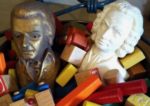PA Shorts: What A Mess!
 I mostly like surprises. I love it when students come in with their own ways of looking at things and their own ways of working out problems. Mostly…
I mostly like surprises. I love it when students come in with their own ways of looking at things and their own ways of working out problems. Mostly…
I’m not so fond of the situations that ensue when students will not consider other ways of working when their way is clearly not effective. I’ve always said that learning is messy. It takes time.
Some students are willing to try new ideas and others resistant. The ones who are more flexible end up with a larger repertoire of practice strategies in the end. I love it when a student comes in and excitedly says, “I did X and it worked! I can play the passage so well now.” It really doesn’t matter if it happened after the first time I advised them to try X or the 100th time. It doesn’t really matter if they heard it from their Uncle Bob’s brother’s second cousin once removed (except to my ego- especially if I have advised X a number of times).
I am slowly learning to embrace the struggles that students experience as they engage with authentic work. If I don’t allow learning to be messy, I eliminate authentic experiences for students as thinkers and creators. I find it important to regularly remind myself that frustration leads to insights and that learning is not necessarily the equivalent of mastery. (Joshua Block, Edutopia)
Time is the element that gets in the way of allowing the mess and the struggle. Deadlines create pressure and stress. Stress is the enemy of learning. The music needs to be attainable within the time frame with just enough challenge to allow learning to take place. If we only assign pieces that are easily attainable within the time constraints-if we feed them everything in small palatable bites, then students are unchallenged and become bored and unmotivated. If the challenges are too great and the deadline too close, then students become overly frustrated, angry, and depressed.
I don’t know how to hit the balance right on every piece. I’ve come to realize that, fortunately, I don’t have to. If students have a variety of work in progress, then everything takes care of itself. Multiple pieces in various stages allows for various challenges and deadlines and for growth through experience.
If one piece isn’t ready for an upcoming performance, it isn’t a crisis because there is something else on the back burner. The true focus of practice can be the music and what it needs. Students can build practice skills and find out what they themselves need. And, if I need to do some more aggressive modeling on a piece or 2 that’s totally fine. There are plenty of other chances for students to dig in and get their hands dirty.


